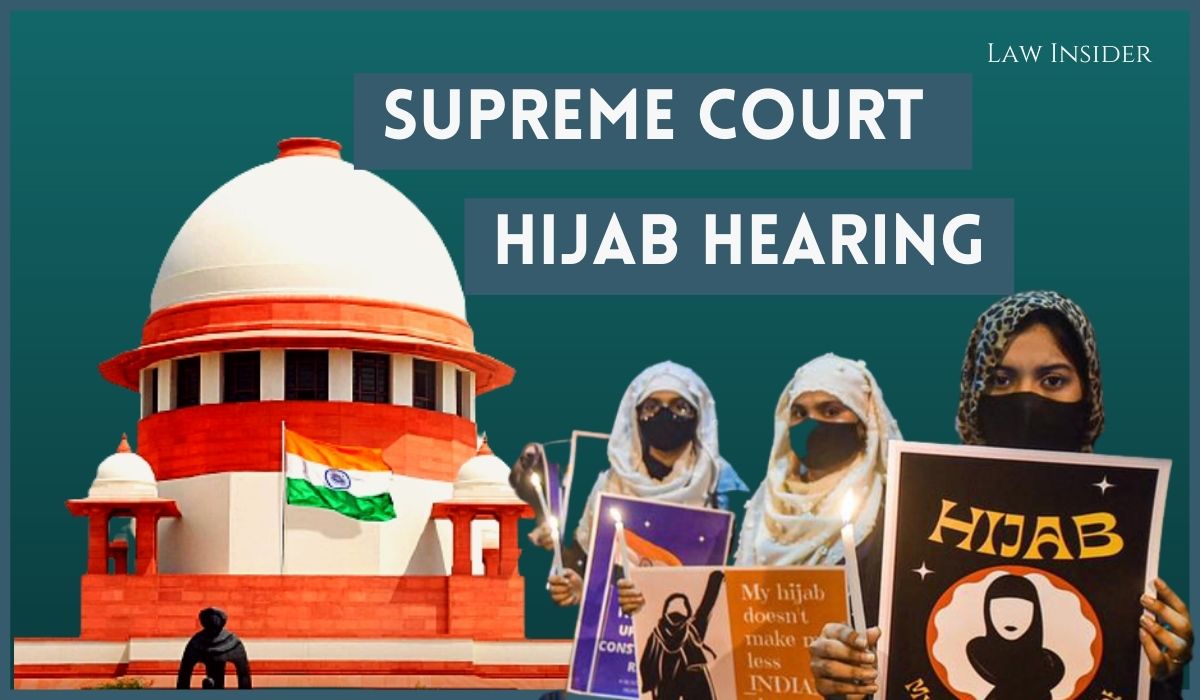Priyanka Singh
Published on: September 22, 2022 at 20:22 IST
The Supreme Court, after 10 days of hearing the case, has concluded its judgment today on a batch of petitions that challenge the Karnataka High Court’s judgment upholding the ban on hijab worn by Muslim Students in Educational Institutes and reserves its judgement.
The bench comprised of Justice Hemant Gupta and Justice Sudhanshu Dhulia, were hearing the Solicitor General Tushar Mehta, Karnataka Advocate Prabhuling Navadgi, and Addl. Solicitor General K. M Nataraj for the State.
Appearing for the college teachers were Advocates R Venkataramani, Dama Seshadri Naidu, and V Mohana.
The petitioner’s side had concluded its arguments on Tuesday.
In the rejoinder submissions today, it was submitted that the mention of involvement of the Popular Front of India was wholly irrelevant and were made to cause prejudice as there was no merit submitted for the same, and stated, “They can’t rely on documents not on record. It is an argument introduced to create a prejudice.”
Senior Advocate Dushyant Dave and Huzefa Ahmadi made the argument that the Hijab, unlike triple talaq and cow sacrifice, is mentioned in Quran and is a ‘farz’ of Muslim women to adorn them.
It was also argued that the apart from the State taking away fundamental rights, it also restricts the notion of ‘behavioural privacy’ and the freedom of conscience as a whole, referring to the Puttaswamy Judgment on privacy that included bodily, spatial, and behavioural privacy as well.
Such a restriction will also hinder the educational growth a person, resulting in a failure of ‘Beti Bachao, Beti Padhao.’
Dave mentioned about the Guidelines issued by the Department of Education for the academic year of 2021-2022, stating that uniform is not compulsory. Therefore, the GO doesn’t supersede the guidelines dated 5th February.
He exclaimed, “It (guidelines) was part of the writ document before the High Court. Solicitor General said it was an unsubstantiated document. But it is substantiated by their own submission before the High Court.”
“How can you disown your own document? I respectfully say it is not right for law officers to say this doc is unsubstantiated when it is a government document.”
However, when asked ASG Nataraj regarding the guidelines, he told the bench that the guidelines do not provide any right and do not affect statutory instructions.
To this, Advocate Shoeb Alam contended relying on the case of (Pharmacy Council of India vs. Rajeev College of Pharmacy) about the definition of law under Article 19(2) being narrow and that a mere circular cannot take away the fundamental rights of citizens.
Is the Hijab Essential?
Justice Dhulia asked, “Issue is whether you are permitting hijab or not.”
To this, Dave explained that wearing a hijab is matter of religious practice where some may take is more seriously than other, thus, implying that it is an individual choice, also asserting that even when it is prayed to the High Court in a religious sense, the High Court has to pursue it with a Constitutional point of view.
On contrary to the laws of France and Turkey, where Hijab is banned, India has Muslim women who carry it and firmly believe it is essential for them to wear it and therefore, it is essential for Indian Muslim Women practicing it.
Whereas, in a country like France, nothing religious can be exhibited, not even a cross, said Advocate Salman Khurshid.
Karnataka GO Targeting Muslims –
Advocate Ahmadi highlighted the facts of the circular stating that it doesn’t deny religious symbols inside the premises, rather only denies the apparel of head scarf, stating that only one community wears headscarf.
“If a circular is issued saying no one can wear turbans, we can know it is targeting Sikhs. It will be facially neutral but targeting one group. Circular has to be read as a whole, its purport has to be read as a whole and its effect has to be seen.”
Karnataka Advocate General cited the Bachan Singh case that held the dominant objective being the highlight and the ancillary effect need not be looked.
He stated that the State only intends to discipline students by regulating their uniform.
Advocate Ahmadi contended against the statements of the AG and stated that the argument of pith and substances cannot be applied to violated fundamental rights, also stating that in the end there was no infraction held in the Bachan Singh case, but in this case it does.
Inversed Burden Of Proof at Karnataka HC –
Advocate Kamat said that the High Court inversely asked the Petitioners to prove their rights to adorn the apparel instead of asking for a technical examination of where the State went wrong.
He stated that only the Bijoe Emmanuel judgment dealt with Article 25 and Article 19 with regards to school discipline.

